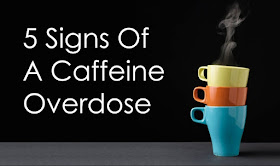Getting your buzz on with coffee, tea or energy drinks doesn’t sound very dangerous or life-threatening, but death by caffeine is, in fact, possible — especially for people with certain health conditions. The recent caffeine-related death of a 16-year-old high-school student raises the question: Who is at risk of a caffeine overdose, and what are the signs?
A study published in Food and Chemical Toxicology determined that a healthy adult can consume up to 400 milligrams of caffeine per day (which amounts to four 8-ounce cups of coffee or six shots of espresso). But that’s just an average, explains osteopathic physician Dr. Christopher Calapai in a press release, and the safe limit for caffeine actually varies from person to person.
“It’s difficult to assign an exact amount for everyone because people can have different sensitivities or reactions to caffeine based on age, medical history and tolerance," says Calapi. The good news is that there is enough research available to make a recommendation based on an individual’s weight.
People with anxiety, panic disorder, heart arrhythmia, high blood pressure and diabetes, and those who take medication, can likely tolerate even less caffeine than the average person, and should see a doctor about how much caffeine is safe for them to consume.
In the case of South Carolina teen David Allen Cripe, who collapsed during class in late April, drinking a McDonald’s latte, a large Mountain Dew and an energy drink in a short period of time was too much for his body to handle. Coroner Gary Watts determined Cripe's death was due to a “caffeine-induced cardiac event causing a probable arrhythmia."
When an arrhythmia (also known as an abnormal heart rhythm) occurs, the heart can’t always pump enough blood to the body, which in turn affects the brain, heart and other organs. While the three drinks Cripes consumed don’t seem like they would contain enough caffeine to kill him, it wasn’t the total amount consumed that resulted in his death, it was the fact that he consumed the amount in such a short timespan.
"We're not saying that it was the total amount of caffeine in the system, it was just the way that it was ingested over that short period of time, and the chugging of the energy drink at the end was what the issue was with the cardiac arrhythmia," the coroner said in a statement.
But how exactly does caffeine kill someone? Calapai explains to IPRESSTV.COM that, similar to other stimulants, caffeine temporarily shrinks blood vessels and increases blood pressure and heart rate. “In excess, the effects can be deadly by causing a heart attack, stroke or other cardio-vascular-related problem.”
Fortunately, death by caffeine is extremely rare. A 2017 study by Alan Wayne Jones determined that there were 51 caffeine-related deaths between 1959 and 2010 and the majority had high levels of caffeine in their blood (the equivalent of drinking 30 cups of coffee in quick succession).
Check out the caffeine levels in these common drinks so you can keep your consumption in check:
-Starbucks Coffee (16 fluid ounces): 320 milligrams of caffeine
-5-hour energy (1.93 fluid ounces): 207 milligrams of caffeine
-Dunkin Donuts regular coffee (16 fluid ounces): 203 milligrams of caffeine
-Starbucks Latte (16 fluid ounces): 150 milligrams of caffeine
-Coffee, brewed (8 fluid ounces): 133 milligrams of caffeine
-Red Bull Energy Shot (2 fluid ounces): 80 milligrams of caffeine
-Red Bull (8 fluid ounces): 80 milligrams of caffeine
-Tea (8 fluid ounces): 53 milligrams of caffeine
The symptoms of a caffeine overdose aren’t exactly pleasant, even if they aren't particularly lethal. Here are some common symptoms that are important to watch out for: jitters and restlessness; nervousness and anxiety; increased heartbeat; nausea; heart palpitations (cardiac arrhythmia); insomnia; sweating; dizziness; vomiting; cardiac arrest.
Most of these symptoms will subside once the caffeine has left your system, which can happen naturally or with the help of medical treatments like activated charcoal, laxatives or a gastric lavage. At-home remedies include drinking lots of water, doing mild exercise or eating potassium- and magnesium-rich foods.
If you are concerned about your caffeine consumption, keep in mind that there are some unlikely products that contain the jitters-inducing drug. According to Calapai, these seemingly caffeine-free products include decaffeinated coffee, chocolate, ice cream and frozen yogurt, breakfast cereals, pudding, hot cocoa, PMS medication and headache remedies.
What Do YOU Think?
Are you worried about overdosing on caffeine? How do you avoid overdoing it with caffeinated products?
